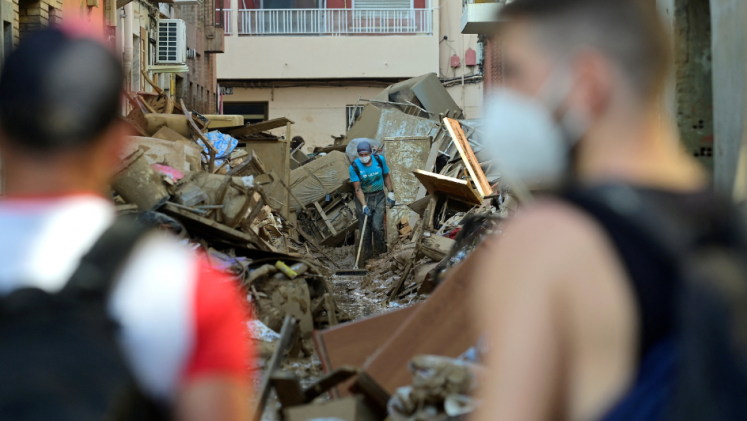What: United Nations University experts available for interviews and comments
When: By appointment. Experts will be in Baku in person, but with different arrival and departure dates.
Where: COP29 in Baku/Azerbaijan, or remotely
Who: Senior experts from United Nations University – Institute for Environment and Human Security (UNU-EHS) focusing on topics of climate change adaptation, risk, loss and damage, climate risk insurance, and more. UNU serves as the global think tank of the United Nations. All experts can give interviews in English. Depending on the topic, other languages may also be possible (predominantly Spanish and German).
Why: COP29 has a packed agenda. UNU experts are able to explain and comment on negotiations, provide background on crucial issues, shed light on emerging topics, opportunities and challenges, and contextualize many of the big debates.
Please find below a few examples of the topics our experts can speak on:
- Negotiations at COP29
- New Collective Quantified Goal on Climate Finance
- Nationally Determined Contributions (NDCs)
- Loss and Damage (funding and issues)
- Climate migration
- Artificial intelligence and climate change
- The role of local governments and community involvement in addressing climate change
- Climate risk insurance - could be in connection to hurricane seasons, too
(see additional information on each topic below)
For more information or to arrange an interview, please contact at COP29:
| Nadine Hoffmann Head of Communication United Nations University Institute for Environment and Human Security Mobile: + (0) 49 151 2672 1390 (mobile) n.hoffmann@vie.unu.edu | Austin Gonzales Senior Communication Assistant United Nations University Institute for Environment and Human Security Mobile: + (0) 49 151 2672 1390 (mobile) gonzales@vie.unu.edu |
Additional information on the above-mentioned topics
- Negotiations at COP29
UNU experts will be sitting in on the negotiations and will be able to comment on expectations, highlights and outcomes, particularly on climate finance, loss and damage and adaptation. - New Collective Quantified Goal on Climate Finance (NCQG)
In order to reach climate goals, many countries require additional financial means, and the costs are rising. A new goal for climate finance is meant to be adopted at COP29, working from the $100 billion per year commitment that countries agreed upon before. This financial target is meant to support particularly developing countries in their climate actions and adaptation to the changing climate. It should provide a more ambitious financial framework to meet their needs, including accessibility to the fund, and it is also meant to leverage more private climate finance. - Nationally Determined Contributions (NDCs)
In 2025, countries must submit new Nationally Determined Contributions, i.e. new climate commitments that, according to the Paris Agreement, must be more ambitious than in the previous round. This process repeats every 5 years with new NDCs, progressively raising targets to reduce emissions. - Loss and Damage
It was decided at COP27 to create a funding arrangement that would respond to losses and damages in vulnerable countries that are hit hard by climate disasters. The fund has now been created, but its scope, scale and policies still need to be worked out in more detail. This will affect who will pay and how much, and who will be able to receive payouts. UNU-EHS experts have followed the developments since the start and are able to contextualize loss and damage. - Climate Migration
Human mobility in the context of climate change is a much-discussed topic. Climate change is threatening the livelihoods of people in many places, which can lead to migration. But the topic is larger than that and also includes questions around those populations who cannot or don't want to move, as well as questions on how to conduct planned relocation or how to address the circumstances in those places who are hardest-hit by climate change in a way that allows populations to stay. Different COP29 decisions will have impacts on people affected by human mobility, for example the Loss and Damage Fund, the New Collective Quantified Goal or the review of the Warsaw International Mechanism. UNU-EHS scientists can also speak about what we know today about future displacement and its costs to society, as well as what conditions tend to lead to people moving vs. choosing to stay. - Artificial intelligence and climate change
Last year’s UNFCCC COP was the first one to include high-level discussions on the use of artificial intelligence (AI) for climate action. AI brings new opportunities in climate mitigation and adaptation, including for the developing world, but there are also concerns around equity and the high energy demands of AI itself. - The role of local governments and community involvement in addressing climate change
Cities and local climate action are driving climate action in many places around the world. But even within cities, some communities are often not heard, for example those in informal settlements, even though they are among the most vulnerable. EHS experts can speak about successful climate action that includes all actors to make cities more sustainable. They can also speak about more innovative approaches to urban transformation, for example by involving art and culture. - Climate risk insurance, hurricane season
Climate risk insurance has been an important topic at COP for a while, but it remains a current topic with the increasing severity of disasters, for instance in connection to hurricane season. Climate risk insurance can help protect individuals, small businesses or entire countries from permanent damage caused by the impacts of extreme weather events. Coupled with preventive measures and social protection, it can help to ensure that losses and damages are kept to a minimum. But there are no one-size-fits-all solutions. Insurance schemes need to meet the needs of vulnerable populations, need to be gender-responsive and sustainable in the long run. UNU-EHS is actively involved in projects that bring climate risk insurance to vulnerable populations, for example in the Caribbean and the Pacific.




